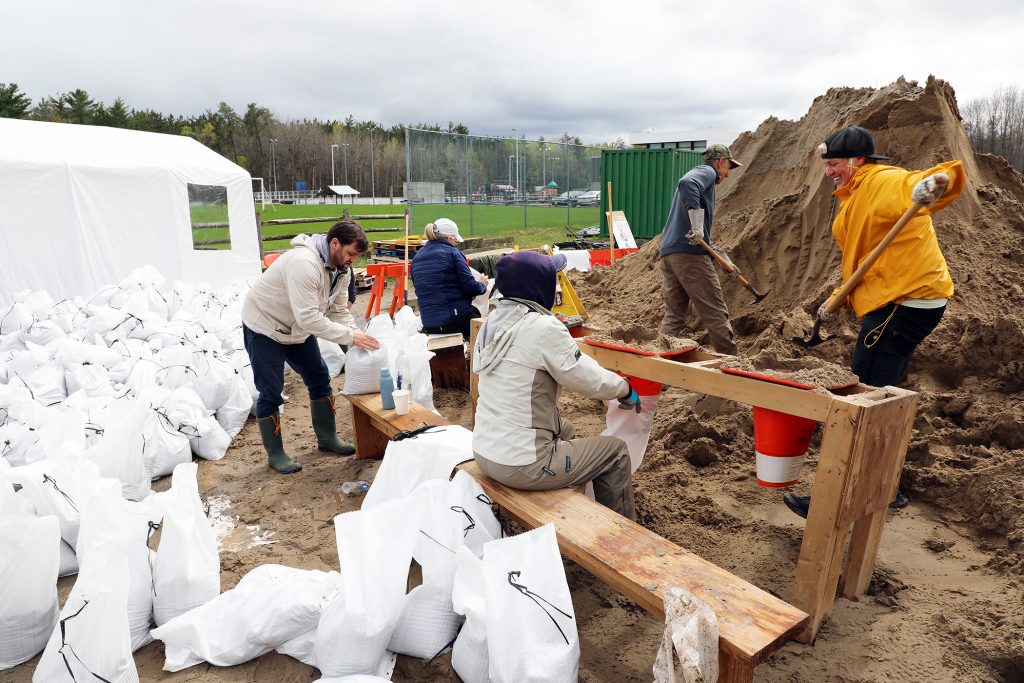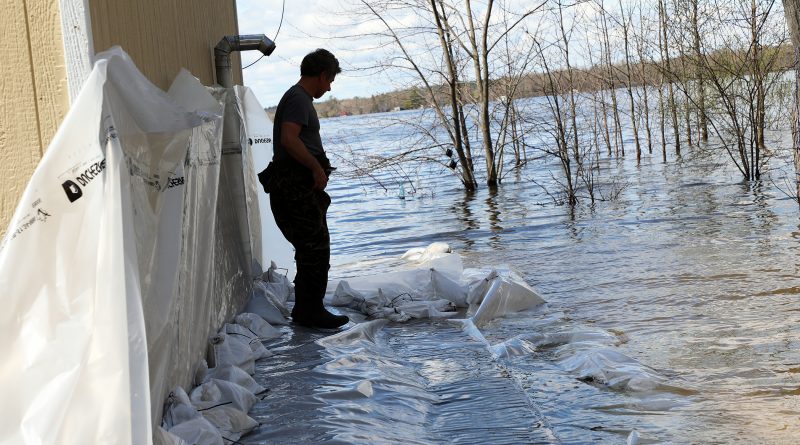Kelly seeks long-term flood solution
By Jake Davies - West Carleton Online
(Editor’s note: As we did during the 2017 flood, 2018 tornado, 2019 flood and COVID-19 pandemic, we are making our coverage of potential extreme flooding in 2023 free access to our entire community providing flooding updates, on-site coverage, important information and resources to West Carleton and beyond, so those outside the area can also better understand what is happing in our rural community)
WEST CARLETON – Although the immediate concerns are far from over, with Ottawa River flood waters are receding this week and Ward 5 Coun. Clarke Kelly is looking at long-term answers to West Carleton’s recent flooding issues.
The spring of 2023 will mark the third time West Carleton’s riverside communities have faced extreme spring flooding since 2017. The goal posts are moving on what we used to describe as a one-on-100-year flood such as experienced in 2019.
All three floods required an incredible amount of city resources, a mass mobilization of volunteer help, and in the end, still caused millions of dollars of damage.
While water levels haven’t quite returned to ‘normal’ spring conditions, the immediate danger is over and Kelly, who was on the front lines of flood fighting every day for almost a month now while also dealing with flooding at his own Constance Bay home, is starting to look at long-term solutions to what seems to be becoming a nearly yearly issue.
Kelly says his team is still surveying the impact of this year’s disastrous flood event.
“It’s hard to get a grasp on the level of damage,” Kelly told West Carleton Online yesterday (May 16).

He says the numbers haven’t changed much since last week. His office knows of 80 homes in Ward 5 that sustained damage from this year’s flooding, but at this time it’s not known the extent of the damage at each home. It could be catastrophic, or it could just include some small damage to the property.
He says he knows of around 12 homes that have sustained serious damage.
“It’s too early to tell if they will need to be destroyed,” Kelly said. “People are reaching out to see if there is provincial or federal help available.”
Kelly says in 2019 both upper-tier governments were very helpful with assistance.
“We’re still waiting to hear back on what resources may be available,” Kelly said.
Meanwhile, the Ottawa River Regulation Planning Board (ORRPB) is recommending residents leave their sandbag walls up for the time being. On Mother’s Day (May 14) West Carleton Online drove around Constance Bay and specifically Bayview Drive, which has been hard hit each and every flood.
The water was much lower, although there was still standing water in many lawns and ditches were full. Many residents were using the warm weather and day off to start piling their sandbags at the end of their driveway – another labour-intense endeavour that does not attract volunteers as readily as the building of the sandbag walls does.
“We’re hesitant to tell people to take down the sandbag walls,” Kelly said, but he is preparing to provide assistance to those who need it with sandbag removal.
Kelly says not much will happen this long weekend, leaving it to those who are able to start dismantling their flood protection.
“After the long weekend we will have a good sense of who needs help,” Kelly said. “The following weekend we’ll make efforts to get to people’s properties to help.”
Kelly says that help will come in the form of a partnership with city staff, West Carleton Disaster Relief (WCDR) and, hopefully, volunteers.
In the long run, Kelly says there needs to be a better plan to flood response, and even a long-term plan to mediate the issue.
“I’m sure this has been an expensive operation,” Kelly said. “That’s the reason ice storm clean-up has been delayed. More than half of that crew was diverted to help with flood mediation.”
Kelly says the first step in coming up with a long-term plan will involve a series of public meetings on the issue.
“We will review why this is happening,” Kelly said. “Why so frequently? What might be a reasonable city response? Solutions on mitigation. I’m going to invite other levels of government and other municipalities affected by flooding to work together and look at the issue.”
It is not a secret, several of West Carleton’s long-established communities are built in flood zones.
“That will be part of the conversation I hope to be leading,” Kelly said. “How can we predict this earlier and share that information in a way people can understand.”
Kelly says the 2017 flood was rated as a one-in-50-year flood; the 2019 was considered a one-in-one-hundred-year flood; and this spring’s flood is classified as a one-in-10 or 20-year flood.
“The goal posts have shifted,” Kelly said. “For 100 years the high-water mark on my parents’ home was never reached. Now it has come near or to it in three of the last five years. If we are spending $100 million to protect 100 houses, that isn’t feasible.”
Many insurance companies have stopped insuring homes built in flood zones or in areas with a history of flooding. In Quebec in 2017, the government created ‘Special Intervention Zones’ a total of 211 of them located in areas defined as vulnerable to flooding every zero to 20 years. The Quebec government forbids all new construction and severely restricts the re-building of damaged homes in those zones. The government compensated those homeowners who lived in those areas to a maximum of $200,000, and the homeowners were not allowed to rebuild in those areas.
Kelly says he hopes and doesn’t expect it to come to that in West Carleton.
“I don’t think we will get to that point,” he said. “We saw those people in Constance Bay who raised their homes, and put in that effort, you could really see the difference during the flood. I do want to have that conversation of what we do from here on out. It could take a few meetings. It might take a few conversations, but those conversations will be happening.”
As of this publication date, no meetings have been scheduled yet.
In Public Safety Service director Beth Gooding’s latest spring flooding Emergency Operations Centre (EOC) updates, she shares good new with those dealing with the flooding.
“We are pleased to report water levels have continued to decline along the main stem of the Ottawa River,” Gooding released in a memo to council obtained by West Carleton Online today (May 17). “At this time, all indicators are for a continued return to seasonal norms in river flow and elevation.”
The Emergency Operations Centre (EOC) is now transitioning its efforts to make flood recovery information available to residents.
“The EOC is updating the city’s website to provide guidance to residents on topics such as sandbag disposal, utility re-activation, and health and safety considerations (e.g., how to disinfect and test your well water after a flood),” Gooding said. “With help from Ottawa Fire Services (OFS), we will also be distributing pamphlets to flood-impacted areas so that residents have a quick reference of easily accessible phone numbers and websites. The visits will commence this Friday (May 19) and continue over the weekend.”
As Kelly mentioned earlier, city clean-up operations will begin the following week.
“We are planning for unused asset cleanup and sandbag collection operations to begin early next week,” Gooding said. “Residents are being asked to bring their filled/used sandbags to the curb for collection. Of note, sand and sandbags that have come into contact with flood waters may have been exposed to contaminants. Residents should wear gloves when handling them. Also, sandbag contents should never be disposed of in lakes, rivers, beaches, parks or other protected areas.”
The EOC expects debris removal operations to take at least a couple of weeks.
“This will allow residents time for the removal of sandbags from private property without an artificial pressure to complete work when planning may be required,” Gooding said. “We estimate there are approximately 140,000 sandbags in West Carleton, Britannia and Cumberland. We are also aware some homes may have flood-related household waste/trash. This can be placed at the curb as part of regular garbage collection.”
In the short-term, the EOC will keep in place the portable toilets that were deployed, as well as the supply of bottled water for residents that lost access to their septic systems or private wells due to flooding. The process through which to test private wells before resumption of use, for example, involves several steps over the course of multiple days. The portable toilets and bottled water are also useful to family members, neighbours, and volunteers who may be assisting with sandbag removals.
Several roads affected by flooding have now re-opened. Armitage Avenue is open between Greenland Road and the dead-end. Lighthouse Lane is open between Loggers Way and the dead-end. Moorhead Road is open between Willola Beach Road and the dead-end.
For all West Carleton Online’s 2023 freshet coverage, click here.











